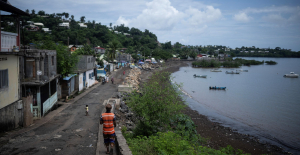The world is failing to deliver on its promise to end and reverse deforestation by 2030 as global forest loss increased last year, a group of experts warned on Tuesday. NGOs and researchers. Last year, deforestation was more than 20% higher than it should have been to meet leaders' commitment. Some 6.6 million hectares of forest have been lost, much of it primary forest in tropical regions.
In 2021, leaders of more than 100 countries and territories, representing the vast majority of the world's forests, pledged to halt and reverse forest loss by 2030. But an annual assessment released Tuesday found that the global deforestation increased by 4% last year, and the world is still not on track to meet the 2030 commitment. “The 2030 target is not just there for show , it is essential to maintaining a livable climate for humanity,” underlines Erin Matson, one of the main authors of this report entitled “Assessing the Declaration on Forests”. Forests are not only essential habitats for animal life, they are also important regulators of global climate and carbon sinks that absorb emissions from human activities.
The assessment, overseen by more than two dozen environmental organizations and research bodies, also warns that forest degradation remains a major problem. The term degradation refers to a wide range of damages, including wildfires and loss of biodiversity, that affect the overall condition of a forest. “Data from year to year tends to change. One year is therefore not the ideal solution,” says Erin Matson. “But what’s really important is the trend. And since the reference period of 2018 to 2020, we are going in the wrong direction.
The picture is not entirely negative, with around fifty countries judged to be on track to end deforestation. Brazil, Indonesia and Malaysia have notably recorded “dramatic reductions” in forest loss. However, this progress is under threat, the report warns. Indonesia's success is partly linked to a moratorium on deforestation, but some fear new legislation on job creation could weaken that commitment. In Brazil, while there is renewed interest in protecting the Amazon, another key ecosystem, the Cerrado savannah, has become a target.
The report praises new rules introduced by the European Union aimed at blocking imports of commodities that promote deforestation. But it calls for stronger global action, including devoting more funds to protecting forests and ending subsidies to sectors such as agriculture that drive deforestation. “The world is failing forests, with devastating global consequences,” warns Fran Price, global head of forests at the World Wide Fund for Nature (WWF). “Since the global commitment (...) was made, an area of tropical forest the size of Denmark has been lost,” she highlights.
The publication of the report comes before the holding of COP28, the United Nations climate conference, which will bring together world leaders in Dubai from November 30 to December 12. However, deforestation risks taking a back seat to discussions about renewable energy and the future of fossil fuels. “We want nature and the forest to be a priority. We fear that (the discussions) are not up to par,” laments Fran Price.

 Gaza: under the spotlight, the Israeli-Palestinian conflict shakes up the Eurovision contest
Gaza: under the spotlight, the Israeli-Palestinian conflict shakes up the Eurovision contest Black soldier killed by a police officer in the United States: the sheriff publishes the video of the arrest
Black soldier killed by a police officer in the United States: the sheriff publishes the video of the arrest In Malmö, the Eurovision party transformed into entrenched camps
In Malmö, the Eurovision party transformed into entrenched camps In Russia, Vladimir Putin stigmatizes “Western elites”
In Russia, Vladimir Putin stigmatizes “Western elites” “Mediterranean diet” or “DASH”, two good tips for eating better
“Mediterranean diet” or “DASH”, two good tips for eating better Fatal case of cholera in Mayotte: the epidemic is “contained”, assures the government
Fatal case of cholera in Mayotte: the epidemic is “contained”, assures the government The presence of blood in the urine, a warning sign of bladder cancer
The presence of blood in the urine, a warning sign of bladder cancer A baby whose mother smoked during pregnancy will age more quickly
A baby whose mother smoked during pregnancy will age more quickly Artificial intelligence lies, cheats and deceives us, and that's a problem, experts warn
Artificial intelligence lies, cheats and deceives us, and that's a problem, experts warn Google Cloud mistakenly deletes UniSuper fund account and deprives 600,000 Australians of their superannuation
Google Cloud mistakenly deletes UniSuper fund account and deprives 600,000 Australians of their superannuation IBM, Amazon, Hager... These record investments expected at the Choose France summit
IBM, Amazon, Hager... These record investments expected at the Choose France summit Boeing's black streak: a second Air France flight diverted in three days for “a smell of heat”
Boeing's black streak: a second Air France flight diverted in three days for “a smell of heat” Paola Locatelli: “Influence is comfortable but cinema gives me adrenaline”
Paola Locatelli: “Influence is comfortable but cinema gives me adrenaline” Swifties attack hotels in Lyon
Swifties attack hotels in Lyon Radical Optimism by Dua Lipa, a tangy album in half-tone
Radical Optimism by Dua Lipa, a tangy album in half-tone Peter Weir rewarded for his career with an honorary Golden Lion at the Venice Film Festival in September
Peter Weir rewarded for his career with an honorary Golden Lion at the Venice Film Festival in September Omoda 7, another Chinese car that could be manufactured in Spain
Omoda 7, another Chinese car that could be manufactured in Spain BYD chooses CA Auto Bank as financial partner in Spain
BYD chooses CA Auto Bank as financial partner in Spain Tesla and Baidu sign key agreement to boost development of autonomous driving
Tesla and Baidu sign key agreement to boost development of autonomous driving Skoda Kodiaq 2024: a 'beast' plug-in hybrid SUV
Skoda Kodiaq 2024: a 'beast' plug-in hybrid SUV The home mortgage firm rises 3.8% in February and the average interest moderates to 3.33%
The home mortgage firm rises 3.8% in February and the average interest moderates to 3.33% This is how housing prices have changed in Spain in the last decade
This is how housing prices have changed in Spain in the last decade The home mortgage firm drops 10% in January and interest soars to 3.46%
The home mortgage firm drops 10% in January and interest soars to 3.46% The jewel of the Rocío de Nagüeles urbanization: a dream villa in Marbella
The jewel of the Rocío de Nagüeles urbanization: a dream villa in Marbella Diving into the secrets of the National Assembly
Diving into the secrets of the National Assembly Institutions: senators want to restore the accumulation of mandates and put an end to the automatic presence of ex-presidents on the Constitutional Council
Institutions: senators want to restore the accumulation of mandates and put an end to the automatic presence of ex-presidents on the Constitutional Council Europeans: David Lisnard expresses his “essential and vital” support for François-Xavier Bellamy
Europeans: David Lisnard expresses his “essential and vital” support for François-Xavier Bellamy Facing Jordan Bardella, the popularity match turns to Gabriel Attal’s advantage
Facing Jordan Bardella, the popularity match turns to Gabriel Attal’s advantage These French cities that will boycott the World Cup in Qatar
These French cities that will boycott the World Cup in Qatar NBA: Boston and Dallas rely on their star duos to win
NBA: Boston and Dallas rely on their star duos to win Athletics: Samba-Mayela improves her own French record in 100m hurdles
Athletics: Samba-Mayela improves her own French record in 100m hurdles “We’re not going to catch fire,” tempers Louis Bielle-Biarrey (Bordeaux-Bègles)
“We’re not going to catch fire,” tempers Louis Bielle-Biarrey (Bordeaux-Bègles) Ligue 1: suspense on all levels
Ligue 1: suspense on all levels


















